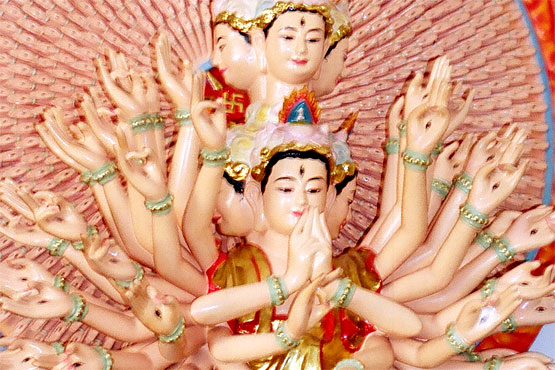
You’d have to be Avaloketeshvara – the Buddha of Compassion, with his 11 heads to hear the cries of the suffering beings in the world and 1,000 arms, with an eye in the center of each palm, to see the suffering and reach out to the multitudes – to comprehend this week in the world.
Seventy-six people killed in Norway by one man with confused views. A famine is declared is southern Somalia; the U.N. children’s agency -- one of the few groups that does operate in the area -- said Friday that nearly 800,000 children are at risk of dying without urgent assistance and that tens of thousands of people may have already have died in the country's famine, which has prompted Somalis to walk for days in hopes of reaching a refugee camp in neighboring Kenya.
Amy Winehouse died at age 27, after a brief career of song and conspicuous consumption of substances. She choose – famously – not to go to rehab, not to face her problems rather than try to wash them away, but society celebrated that.
So much sorrow in the world. Not an unusual week, perhaps – a gunman instead of an overcrowded, unsafe ferry in southeast Asia; a famous singer instead of the addict on the corner; the famine is not new this week. But it hits me in the heart, maybe because a friend writes that he has moved into his father’s hospital room maybe because a 23-year-old girl who had played on grade school soccer teams with my son died in a car crash. Every person who died in Norway, everyone who dies in Africa after walking for miles to try to survive, is dear, is important.A thousand arms can’t begin to take in all the suffering.
Then comfort comes in an unlikely source – an emailed link from a non-Buddhist friend to an interview in Rolling Stone (not a place I often look for wisdom) with the man who’s said to be the reincarnation of Avaloketeshvara: The Dalai Lama. (Note: The Karmapa also is considered by many to be a reincarnation.)
Conducting the interview – is Melissa Mathison who was the screenwriter for “Kundun,” a film about the DL’s life, and has known him since 1990.
Does evil exist in the world? she asks. He replies: 
The seed of evil, from my viewpoint, is hate. On that level, we can say that everyone has that seed. As far as sort of potential of murder is concerned, every person has that potential. Hatred. Anger. Suspicion. These are the potentials of negative acts.
There is also the potential for mercy. Forgiveness. Tolerance. These also, everyone has this potential.
Evil means that the negative potential has become manifest. The positive remains dormant.
Dormant, but there. This is how the bodhisattvas keep going, keep trying to fulfill their vows to bring all sentient beings to Nirvana before going there themselves.
We reap what we sow. Hatred breeds hatred. If we cultivate the seeds of anger and aggression, that’s what we get. If we instead tend gardens or mercy and tolerance, we’ll have a different environment.
How do we create mercy and tolerance, and avoid the clinging vines of anger and aversion?
I often tell people that this century should be century of dialogue. Peace will not come from thought or from Buddha. Peace must be built by humans, through action. So that means, whenever we face problem — dialogue. That's the only way. For that, we need inner disarmament. So our work should make a little contribution to materialize a peaceful, compassionate world later this century. That's my wish. It will not come immediately. But we have to make the effort. This moment, it looks only like an idea. But every corner must make the effort. Then there is possibility. Then, if we fail in spite of that effort, no regret.
Is there an effort you can make in your corner to cultivate the seeds of peace and contentment? Can you wait patiently for a slow store clerk? Not snap back at a co-worker’s snide comment? Catch the ball of impatience and intolerance that’s rolling down the hill, gathering steam and growing bigger as it passes along a chain of interaction, each person adding his or her frustration and sending it down the line? Smile? At no one in particular?
I can’t comfort grieving parents – or children. I can’t figure out a way to get food to starving people. All the metta meditation in the world won’t change their circumstances.
But I can try to act with care and compassion for those people I do have contact with. I can donate to my local food bank, which is struggling to collect enough food to feed my neighbors. I can listen, without judgment, to the problems of those around me. I can offer a gentle response.
The best way to solve these problems is in the spirit of reconciliation. Talk. Listen. And discuss. That's the only way.

**The photo of the Somali woman and her child is by Brendan Bannon, taken from Doctors Without Borders. For more photos and details on what you can do visit
http://www.doctorswithoutborders.org/news/articlefull.cfm?id=5470&cat=slideshow
all other photos by the Associated Press
http://www.rollingstone.com/politics/news/a-conversation-with-the-dalai-lama-20110721?page=1

No comments:
Post a Comment